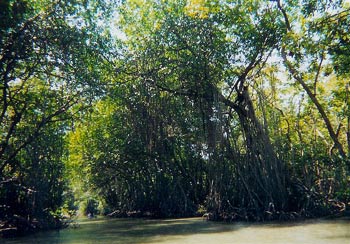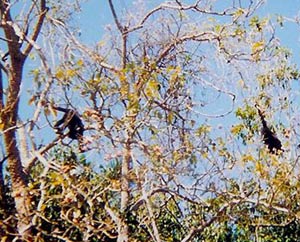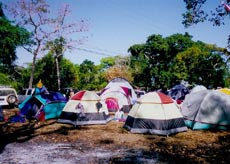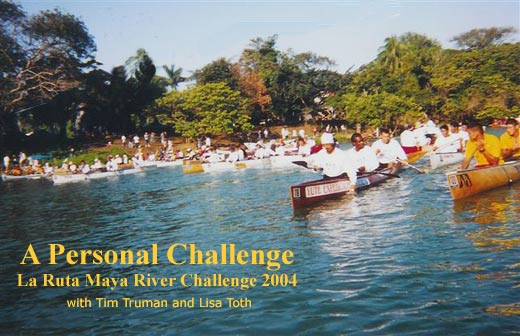 |
There are 7 divisions in the race: Male, Female, Mixed, Masters, Dory, Intramural and Pleasure Craft, and we were to compete in the Pleasure craft division. The Race started in the beginning of March and it looked like we were all set to go; Julian had found a canoe, a third person for our team and we had plane tickets all set up, when just a month away, the canoe wasn’t available and our third person was not able to make it. We had the option of backing out or scrambling to try and put something together and we all decided to try and make it happen. Luckily, a plan came together and we were on our way. We arrived in Belize City and from there we boarded a bus to St. Ignacio where the race would start. We realized what a big event this was when we were in Belize City. Everyone we spoke with was impressed that we were going to participate in the race and wished up luck, and the cover of the Belize City phone book was a spread on the La Ruta Maya River Challenge. Once in St. Ignacio, we finally met up with Julian and the third person for team, Eduardo, a Ketchi Mayan from the Toledo District. It was quite an honor for Eduardo to participate in this important race and represent his village of Indian Creek. He had also never been to Belize City before and was looking forward to seeing the city. We had heard in Belize City that the Mayans were the best paddlers, but to our surprise, we found out that evening in conversation with Eduardo, that he had never touched a paddle before in his life. He seemed nervous about being in the race, but we tried to encourage him, letting him know that we would help him along the way and that our ultimate goal was to just finish the race. In addition to no previous experience in a canoe, there was a communication mix-up and he had not brought any camping gear either. It was too late to do anything that evening and we figured that we could work something out for him with what we had brought for ourselves. |
||||
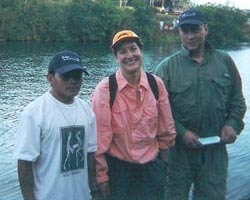 |
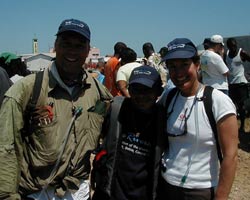 |
|||
| The
BelizeRivers.org team Edurdo Pop from Indian Creek, Toledo, Belize,
Lisa Toth and Tim Truman of Indianapolis, Indiana, just before
the start of the race in San Ignacio (left photo) and after the
finish line in Belize City (right photo) |
||||
Orientation was that night, where all the teams gathered to hear the rules and regulations of the race and how things would be organized for the next 4 days. The local TV news was on site and Julian arranged for our team to be interviewed, which was televised later that evening. We also had a chance to meet with the National Geographic Explorers club team, which consisted of the President of the club, Richard, and two of his friends, Bo and Jonathan. It was their first time participating in the race as well and they were in our division, so we decided our goal would be to try and keep up with these guys. We retired early that night in anticipation of an early start the next day. Day 1: The next morning we awoke to drums beating in the distance. We nervously got all of our gear together and headed down to the river to see what kind of canoe Julian had arranged for us and to get started. The whole town was up, with people lined along the shore and both bridges crossing the river. Excitement and anticipation was thick in the air. We
found the fruit truck that would transport our gear from camp
to camp, picked up our supply of water and bananas, which were
to sustain us for the day, and headed to our canoe. It was a mass
start, in which everyone lined up across the river according to
two visual markers on either side of the river. There were 88
teams total and the professional teams were to line up in front.
It was tough trying to keep the canoe in place with 88 canoes
jammed together and the current pushing the boats as well. The
BATSUB (British Army Training Service Unit Belize) crew were the
official timers of the race and they began the starting countdown
with a megaphone. At zero we were off! It was a frenzied sprint,
with rough water being caused by the mass start. Canoes were tipping
over and teams were pushing others away that came close. The crowd
was cheering loudly and the local fire dept. had the hoses spraying
water across the river from both sides. It was very exciting and
the adrenalin was pumping. |
||||
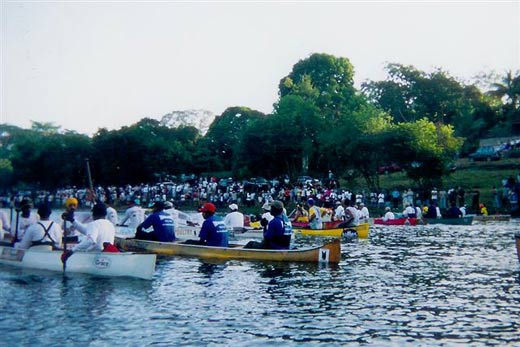 |
||||
The
Start of the Ruta Maya River Challenge 2004 in San Ignacio on
March 5, 2004. This photo is taken from the canoe of the BelizeRivers.org
team. |
||||
Thirty minutes into the race, the crowd of canoes started to spread
out, and we tried to get into a rhythm that would last us for
the 49 miles that we had to cover that day. There was a lot more
flat-water to the river than we expected, with only occasional
shoals and small rapids where the current moved more swiftly.
A lot of the canoes would tip in the faster moving water, but
throughout the whole day we managed to not tip over. We also had
the advantage of river running experience, so we were able to
use the current, when it was around, to our advantage. Overall,
it was a grueling, long, hot, eight hour day on the water. The
only thing that kept us going was the competition with the other
canoes, like the National Geographic team whom we managed to beat
that day. Each day, or stage, was timed and at the end of the
race, your total time would determine your standing, but it was
the small competitions each day with other canoes that would keep
us motivated.
By the time we reached our first camp, Banana Bank, we were all exhausted and starving. We were told at orientation that lunch and dinner would be provided for us, but what we did not know was that both were provided at the camp. So, if you were a fast team that made it there in four hours, you received your lunch at a reasonable time and dinner later that evening, but if you were a slower team, like us, that finished in eight hours, you received your lunch and dinner right after one another. We ate our lunch of fried chicken wings and French fries, and then picked up our camping gear and found a spot to set up. We set up our rain-fly for Eduardo, using our paddles as a pole and then gave him a camp chair that lay flat, so he had something beside the ground to lie on. It worked really well and luckily it did not rain during trip. After dinner, we talked about how tough this first day had been and how we were dreading tomorrow, which was going to be the longest day of 60 miles. We all took some Motrin and went to bed, hoping to get some rest for our tired bodies. Day 2: It was a beautiful night with a bright full moon and cool temperatures. Our alarm clock the next morning was a man in the camping area bellowing, “get up, get up”. It was 4:30 am. The start was at 6:30 am. We packed up and got on the river for another long day. Eduardo commented that he felt strong that morning, which encouraged us. Once on the water, we heard some strange noises from the bush, which Eduardo informed us, were Howler monkeys. We had heard the noises the night before in camp, but did not know what it was. We were not too far into the race, when Eduardo spotted some monkeys in the trees. The rest of the day, we spotted many more monkeys (and heard them too), along with many iguana and tropical birds. It was a long day, but a beautiful stretch of river. There were always supporters cheering for you along the way as well. We would travel through areas of jungle, then come across a small clearing with people swimming or washing their clothes, or just sitting and watching, all of them giving some encouragement to the participants. We found ourselves paddling with the same group of people during the race; a BATSUB team, a Peace Corp team, the Fyffe Banana Export team and a team of girls that were volunteer teachers. It was a friendly, competitive atmosphere, with conversation back and forth to pass the time as we would pass each other on the river.
The dreaded second day of paddling ended up being a lot better
than we anticipated. We finished in about 8.5 hours, just a little
longer than the previous day! We set up camp, purchased some rum
drinks and waited for our dinner of stewed chicken, rice and beans.
We sat around and discussed the day with the guys from the Explorers
club and watched the sunset over the hills, giving our support
to the lingering teams still getting to camp. It felt good to
know it wasn’t us! Later that night, as we were going to
sleep, the locals serenaded us with Patsy Cline and other country
songs on the karaoke machine at the local bar. Laughter also filled
the night air from the local women cooking our breakfast for the
next day on an open wood burning stove. |
||||
Day
3: We thought the worst part of the race was behind
us since today we only had to cover 36 miles. No problem! Packing
up and eating breakfast was at a more relaxed pace and we actually
were able to get a cup of coffee, some Ben Gay rub, and Baby Ruth
candy bars. We got a pretty good start this morning, catching
the surf behind the wakes of the other boats, and we felt like
we were really moving for a while! Coming around the first bend,
still in a pretty tight pack, there were two large trees in the
river, one coming out from each bank with a canoe stuck on the
right one and people swimming downstream; it was chaos. We smoothed
right through and stayed in the current, while the safety boat
took care of the carnage. Soon the adrenaline of the start ebbed
and the ache of 109 miles set in, and boy, did that suck; but,
we just kept paddling. Flanked by the Fyffe Banana Team and the
Peace Corp group we rolled through the valley looking for iguanas,
listening for howler monkeys, drinking 12 oz. packets of water
and you guessed it – paddling.
About 25 miles into our day, the river made a sweeping turn to the left and the paddlers ahead of us started to put on life jackets. Several people on shore warned us of “big falls” ahead and told us to make sure to run on the river right side. We put on our life jackets and looked forward to a good rapid ahead. As we paddled to the right at the current split, we saw the other teams in front of us sliding over rocks. When we looked over to the left, there was a nice three foot standing wave and some nice fast current. Dang! We just missed the best wave on the river! It was especially aggravating since the rest of the day it felt like we were paddling up stream in pea soup, because the current was so slow. Instead of being easier than the day before, this day turned out to be the most painful. We finally heard the music from Burrell Boom, but it still took us another 2 hours to reach camp. During this time, Eduardo enlightened us about the monkey’s habit of pooping and peeing on people down below. We made sure that we did not get to close to shore under the trees. The scene at Burrell Boom was a small street fair on the river bank, with make shift shops set up and people selling roasted chicken, beans and rice, home made wines and many other items. Everyone was having a great time, especially the older men playing dominos and the karaoke singers. We pulled the boat up on the ramp and someone handed us a cold beer; we were finally getting the hang of this canoe racing. We saw the Explorer’s club team and found out that they were the team that was wrapped around the tree at the beginning. Their account of the whole incident was pretty hairy, but they came out unscathed, except for a nasty cut on Jonathan’s forehead, which we helped clean up. That night while we ate dinner, they showed video of the race on the side of the dinner truck. It was really impressive to see the top teams in action, since we normally only see them for a short while at the start. |
|||
The start this day was another exciting one. A BATSUB helicopter was hovering above and the shore was crowded with spectators. Today was our shortest stretch of 25 miles and everyone was primed to finish. We were off in a quick sprint and were able to keep up with the front boats even longer today, but all to quickly, reality set in and it was going to be a long 25 miles to the finish. The river had become wider and slower, and there was a significant wind coming in from the ocean. There were a lot more spectators on this last stretch since we were getting closer to the city and all of them were cheering loudly for the racers. There was turn off the river into a mangrove forest that we needed to take in order to get to the finish in downtown Belize City, otherwise, we would have ended up in the Caribbean Sea. The mangrove forest was a beautiful, surreal area, with a channel that ran only fifteen feet wide with a lot of turns and a lot of roots. Once we were out of the mangroves, we only had 2 miles left! Paddling was getting very difficult with the wind and tide, but we knew the end was close. Finally, we saw the finish, with crowds cheering on both sides of the river and on the bridge. Yes! We did it! Overall, it really was a great experience and we met so many wonderful people along the way that we hope to see again. We would like to thank Belizemagazine.com and Belize Rivers.org as our sponsors and look forward to racing again next year! |
|||
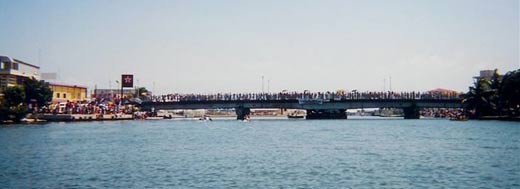 |
|||
The
Finish of the 2004 Ruta Maya River Challenge at the Belkan Bridge
in Belize City, seen from the canoe.... |
|||
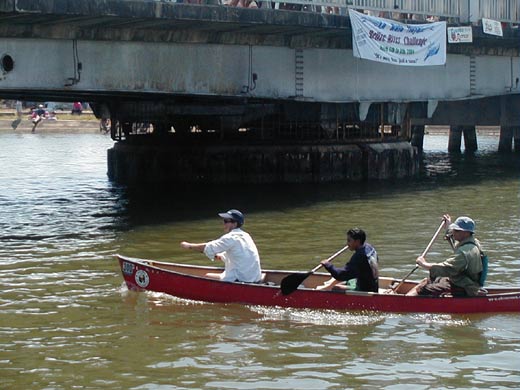 |
|||
....
and the team as it reaches the end of the race. |
|||

